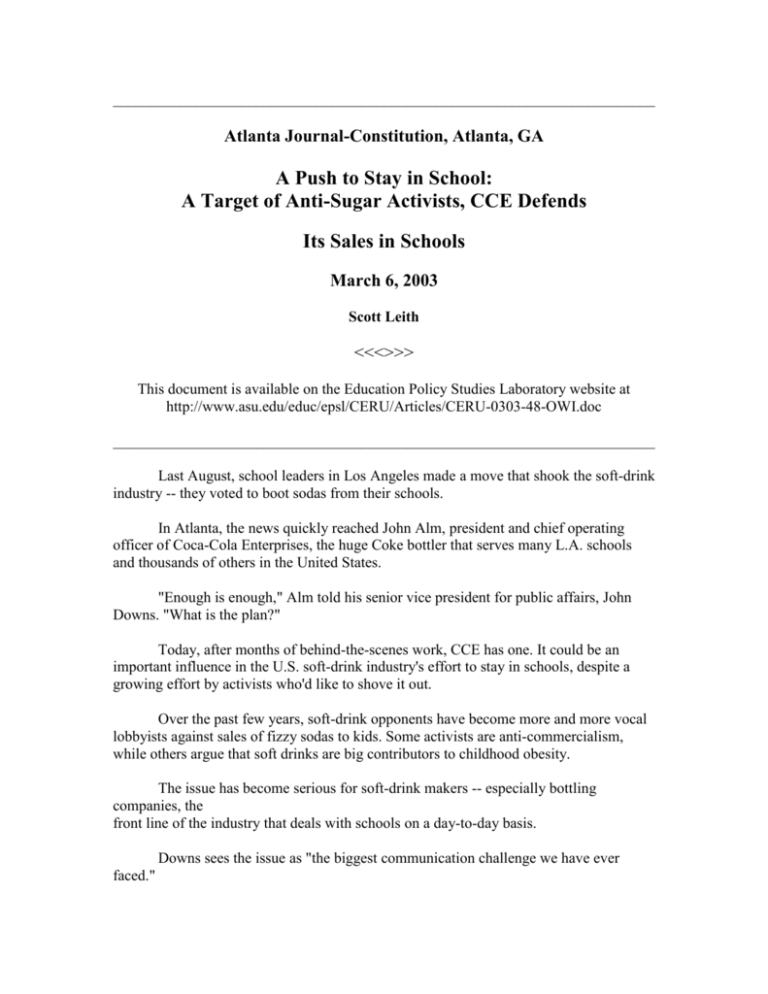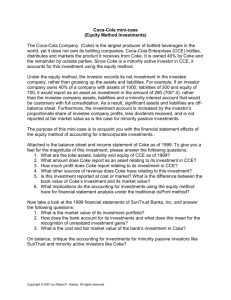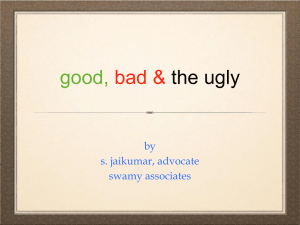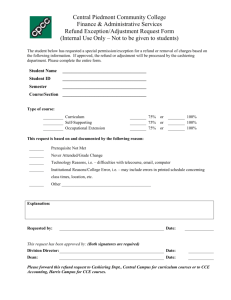Word - National Education Policy Center
advertisement

________________________________________________________________________ Atlanta Journal-Constitution, Atlanta, GA A Push to Stay in School: A Target of Anti-Sugar Activists, CCE Defends Its Sales in Schools March 6, 2003 Scott Leith <<<>>> This document is available on the Education Policy Studies Laboratory website at http://www.asu.edu/educ/epsl/CERU/Articles/CERU-0303-48-OWI.doc ________________________________________________________________________ Last August, school leaders in Los Angeles made a move that shook the soft-drink industry -- they voted to boot sodas from their schools. In Atlanta, the news quickly reached John Alm, president and chief operating officer of Coca-Cola Enterprises, the huge Coke bottler that serves many L.A. schools and thousands of others in the United States. "Enough is enough," Alm told his senior vice president for public affairs, John Downs. "What is the plan?" Today, after months of behind-the-scenes work, CCE has one. It could be an important influence in the U.S. soft-drink industry's effort to stay in schools, despite a growing effort by activists who'd like to shove it out. Over the past few years, soft-drink opponents have become more and more vocal lobbyists against sales of fizzy sodas to kids. Some activists are anti-commercialism, while others argue that soft drinks are big contributors to childhood obesity. The issue has become serious for soft-drink makers -- especially bottling companies, the front line of the industry that deals with schools on a day-to-day basis. Downs sees the issue as "the biggest communication challenge we have ever faced." With that in mind, CCE is planning a much more vocal defense of its business, coupled with policy changes the company hopes will defuse some of the controversy. Among the changes: CCE executives are telling their salespeople to give schools more choices in what kind of beverages they carry. The Coke system already offers beverages ranging from soda to water to juices, but the change means staffers won't push schools to sell soft drinks. CCE also is eliminating big upfront payments to districts that sign long-term deals. These payments, sometimes in the millions, have often raised the ire of critics. CCE's new approach combines these changes with its position that the nation's obesity problems can't be blamed solely on soft drinks. The company is tracking research, looking for counterpoints to years of anti-soda lobbying. CCE and others also are funding programs that encourage exercise, like Coke North America's "Step with it!" initiative, which was rolled out in several U.S. schools last year. One thing is certain: CCE and its brethren want to stay in schools. And schools often are happy to have them, given that money from vending can pay for programs they might otherwise do without. "The school system is where you build brand loyalty," Alm said. CCE certainly isn't alone in recognizing a need to directly address the growing criticism. Several companies that sell "junk food" as part of their product lineups are becoming more vocal. McDonald's, for example, recently announced a "healthy lifestyles" program, including creation of an advisory council of outside experts that will guide the company on promotion of "balanced, healthy lifestyles." Pepsico, which gets much of its sales revenue from its Frito-Lay snacks unit, is trying to deal with health trends by offering more nutritious offerings. Coke, Pepsi at Forefront While much of the concern about obesity centers on junk food in general, schools have become a major focus of the debate, putting Coke and Pepsi in the spotlight. "We don't see any reason whatsoever to have Coke or Pepsi vending machines in schools," said Brita Butler-Wall, executive director of the Citizens' Campaign for Commercial-Free Schools in Seattle. According to the American Dietetic Association, all foods can fit into a healthy diet. The ADA cautions against going overboard, however, such as eating the giant portions served at fast-food chains or drinking huge amounts of soda. The healthy lifestyle approach is the one favored by the soft-drink industry, which argues that it's OK to drink sugary sodas, as long as kids get exercise, too. In the past, much of the burden of lobbying this point went to the National Soft Drink Association. While the group remains active on the subject, Alm said it was a misstep for CCE to stay relatively quiet for so long. "I wish we could back up 10 years and do things differently." In the meantime, the anti-soft-drink movement has gained steam. In California, the hotbed of such activity, well-organized groups have lobbied school boards and state legislators. An organization called California Project LEAN has an extensive Web site that includes a guide called "Taking the fizz out of soda contracts." The industry argues that statistics often are misused, however. For example, it claims that opponents overstate soft-drink consumption and its correlation with obesity. Part of the industry's approach is to send out information of its own. In-house Campaign CCE's own efforts revolve around a program called "Your power to choose," which the company calls an education campaign to tell "the truth about soft drinks." Many of CCE's 56,000 U.S. employees have already heard the pitch, because the company sees them as a first line of defense against critics. In the future, "Your power to choose" will be elevated into a campaign aimed at lawmakers and school leaders. Coca-Cola itself is involved in the issue, too, but in other ways. The company's director of nutrition and health sciences, Dr. Maxime Buyckx, has been tracking studies that look at sugary drinks and obesity. "There really is no correlation between soft-drink consumption and obesity," he said. But it is CCE and other bottlers that deal with schools, not Coke, so changes at the bottler are much more likely to have a practical impact. For example, Coke received widespread attention in March 2001 for declaring it would encourage bottlers not to require exclusive beverage contracts with schools. Jeff Dunn, head of Coke North America, said at the time the goal was to avoid using education as a "marketing vehicle." But without bottlers onboard, it was mostly symbolic. CCE's approach has more tangible elements, including: * Alm and other CCE leaders are pushing for internal changes, starting with plans to rein in a sales force that is accustomed to selling as much soda as possible in schools. Now, Alm said, they "need more discipline" in dealing with schools. "It's a huge change for us." * In a February memo to employees, Alm laid out a new "manifesto for the education channel," including plans to end upfront payments to schools. * CCE's lobbying campaign will gear up, with a pair of new videos. One is for use externally, to be shown to politicians, schools and such. The other is an internal video that will be seen chiefly by CCE employees. Both include snippets from well-known politicians, including U.S. Sen. Lamar Alexander (R-Tenn.) and U.S. Secretary of Health and Human Services Tommy Thompson. Alm also appears. In one, he calls the obesity issue "a war that's been declared on our company." * CCE's overall effort will emphasize promoting physical activity for kids, not cutting out soft drinks. "I ask that each employee become an advocate," Alm said in a memo. Allies Line Up CCE's more aggressive approach has met mostly with favor in the industry, while critics are skeptical, if not dismissive, of the plan. Lauren Steele, vice president for corporate affairs at Coca-Cola Bottling Company Consolidated in Charlotte, applauded CCE for opposing those who've targeted soft drinks, although he's concerned about connecting the issue too closely to Coke. "We would like to see this dealt with as an industry, and not as a brand," Steele said. "But it's clearly time for the soft-drink industry to fight back." Larry Jabbonsky, a spokesman for Pepsi-Cola North America, said the Pepsi system already allows schools to choose their drinks, rather than setting quotas for sales of certain products. "That's been our approach all along," he said. Michael Jacobson, executive director of the activist group Center for Science in the Public Interest, sees the industry's approach as "designed to distract people from the underlying concerns about their unhealthy products." Jacobson said soft-drink makers do sponsor exercise programs, but they are minuscule in comparison to the millions spent on marketing products. "Whenever food manufacturers have been thrust into the spotlight because of health concerns, they've mounted PR campaigns," Jacobson said. Meanwhile, schools and beverage companies continue to sign contracts, as they have for years. In Georgia, for example, DeKalb County schools recently renewed a deal with Coca-Cola Enterprises. The new contract is worth about $10 million over five years. While that amount is small for a district with a yearly budget of about $705 million, spokesman Spencer Ragsdale said DeKalb is "grateful for any support" it can get. Lori Lambert, manager of education cold drink sales for CCE's Atlanta division, said DeKalb's new deal was signed with CCE's new guidelines in mind. "We sat down and said, 'What needs do you have today?' " she said. Gail Woodward-Lopez, associate director of the Center for Weight and Health at the University of California at Berkeley, said she welcomes a different approach. "I congratulate the industry, if they participate in an honest effort to make healthy beverage options affordable, good tasting and accessible." But, she said, industry powers shouldn't try to focus their arguments largely on telling people to get more exercise. "Promoting exercise is wonderful, as long as we don't use it to distract from the focus on healthy eating," Woodward-Lopez said. "To me, that's a little bit of passing the buck." ##






